Key Projects & Publications
Articles
-
Addressing bullying through critical making (Hughes et al., 2018)
Addressing bullying through critical making
- Janette Hughes, Laura Morrison, Ami Mamolo, Jennifer Laffier, Suzanne de Castell (2018)
This paper explores how maker pedagogies helped middle school students develop transferable competencies, such as creativity, problem solving, self-directed learning and citizenship skills. We offer an in-depth look at how purposeful or critical making related to bullying awareness can help struggling students develop positive attitudes related to their roles as contributing members of a classroom community of learners.
-
Digital making with “at-risk” youth (Hughes, 2017)
Digital making with “at-risk” youth
- Janette Hughes (2017)
Purpose
The purpose of this paper is to explore how a small group of adolescents in an alternative care and treatment program develop digital literacy skills over time while immersed in a rich media setting. It also explores how the students use new media tools and affordances to “perform” their identities and to present themselves within their classroom community.
Design/methodology/approach
This ethnographic case study research involved seven students from a Canadian alternative school that provides educational programming for students from government approved care, treatment, custody and correctional facilities. Through an integrated arts-based curriculum, with a thematic focus on community and identity, the students used a variety to digital tools and media to create an “All About Me” book.
Findings
The students used inquiry-based learning and multiple modes of expression, facilitated by the multimodal, multimedia nature of digital media, including both screen-based and tangibles as essential components of knowing and communicating. The maker pedagogies employed in this intervention facilitated self-directed learning, as well as the development of perseverance and self-confidence.
Originality/value
In many work environments individuals are required to have knowledge of emerging technologies, and to employ this expertise in their work. Teaching students how to navigate their way through unfamiliar technology, to reflect on the process, and to communicate effectively, are important in both academics and future work environments. The authors continue to work with this group of students in the STEAM-3D Maker Lab and emphasize learning through discovery, design and the development of important skills such as perseverance, troubleshooting, resilience and collaboration.
-
Evaluating strategies used to incorporate technology into preservice education: A review of the literature (Kay, 2000)
Evaluating strategies used to incorporate technology into preservice education: A review of the literature
- Robin Kay (2000)
The following paper is based on a review of 68 refereed journal articles that focused on introducing technology to preservice teachers. Ten key strategies emerged from this review, including delivering a single technology course; offering mini-workshops; integrating technology in all courses; modeling how to use technology; using multimedia; collaboration among preservice teachers, mentor teachers and faculty; practicing technology in the field; focusing on education faculty; focusing on mentor teachers; and improving access to software, hardware, and/or support. These strategies were evaluated based on their effect on computer attitude, ability, and use. The following patterns emerged: First, most studies looked at programs that incorporated only one to three strategies. Second, when four or more strategies were used, the effect on preservice teacher’s use of computers appeared to be more pervasive. Third, most research examined attitudes, ability, or use, but rarely all three. Fourth, and perhaps most important, the vast majority of studies had severe limitations in method: poor data collection instruments, vague sample and program descriptions, small samples, an absence of statistical analysis, or weak anecdotal descriptions of success. It is concluded that more rigorous and comprehensive research is needed to fully understand and evaluate the effect of key technology strategies in preservice teacher education.
-
Exploring the use of video podcasts in education: A comprehensive review of the literature (Kay, 2012)
Exploring the use of video podcasts in education: A comprehensive review of the literature
- Robin Kay (2012)
The purpose of this article was to provide a comprehensive review of research on video podcasts from 2002 to 2011 in order to guide future studies and educational practice. Fifty-three, peer-reviewed articles were selected from an extensive search of the literature. Key topics included the history and growth of video podcasts, types of podcasts, previous literature reviews, benefits and challenges of using video podcasts, methodological concerns, and suggestions for future research. Key benefits included positive affective and cognitive attitudes toward video podcasts, control over learning, improved study habits, and increased learning performance. Key challenges included a variety of technical problems, preference of some students for lectures, and reduced class attendance. Methodological concerns involved insufficient description of video podcasts examined, limited sample selection and description, and the absence of reliability and validity estimates for data collection tools. Suggestions for future research include focusing on the quality and design of video podcasts, pedagogical strategies, viewing patterns and impact on learning effectiveness, and in individual differences in video podcast use.
-
Inclusive and accessible physical education: Rethinking ability and disability in pre-service teacher education (Barber, 2016)
Inclusive and accessible physical education: Rethinking ability and disability in pre-service teacher education
- Wendy Barber (2016)
This paper identifies and explores emergent themes in inclusive PE in the specific context of pre-service teacher preparation programs. Fully inclusive PE encompasses four areas: knowledge and curricula related to ability and disability, teacher attitudes, pre-service teacher education and a reframing of our understandings of multiple perspectives on physical literacy. Fully accessible PE involves material and attitudinal conditions configured to render these programs actually usable by all those whose ‘inclusion’ is intended. Access is, indeed, conceptually implied in ‘inclusion’, however, in practice the latter can easily become more of a slogan naming an aspiration than a realizable state of affairs. Unless an organization or individual brings a universal commitment to access, attitudinal barriers may prevent full inclusion from becoming a reality. The paper uses qualitative case study methodology to examine pre-service teacher education students’ preconceptions about ‘dis’ability and analyses heuristically how pre-service teachers pre-conceived notions of ability and disability may be challenged through an intervention. 21C PE programs can move towards an emphasis on inclusive activities which are not based on traditional conceptions of physical competence, size, shape, appearance and ability, but instead focus on how all bodies can develop fundamental movement skills, functional fitness and physical literacy. The author challenges pre-service students to address issues of accessibility, normative notions of ability, body equity, social justice and inclusion, as well as the need for multiple definitions of physical literacy. The paper is a case study of the specific phenomenon of ‘broadening student teachers’ understandings of ability and disability in PE’ as a necessary condition for preparing students to work in schools where full inclusion may not have been integral to PE policies, programs and practices.
-
Knowledge mobilization practices of educational researchers across Canada (Cooper et al., 2018)
Knowledge mobilization practices of educational researchers across Canada
- Amanda Cooper, Joelle Rodway, Robyn Read (2018)
Researchers are under increasing pressure to disseminate research more widely with non-academic audiences (efforts we call knowledge mobilization, KMb) and to articulate the value of their research beyond academia to broader society. This study surveyed SSHRC-funded education researchers to explore how universities are supporting researchers with these new demands. Overall, the study found that there are few supports available to researchers to assist them in KMb efforts. Even where supports do exist, they are not heavily accessed by researchers. Researchers spend less than 10% of their time on non-academic outreach. Researchers who do the highest levels of academic publishing also report the highest levels of non-academic dissemination. These findings suggest many opportunities to make improvements at individual and institutional levels. We recommend (a) leveraging intermediaries to improve KMb, (b) creating institutionally embedded KMb capacity, and (c) having funders take a leadership role in training and capacity-building.
-
Learning vocabulary via computer-assisted scaffolding for text processing (Li, 2010)
Learning vocabulary via computer-assisted scaffolding for text processing
- Jia Li (2010)
A substantial amount of literature regarding first language (L1) acquisition has shown that reading for meaning significantly contributes to vocabulary expansion and strongly relates to overall academic success. Research in the English as a Second Language (ESL) context, however, has presented mixed results, in particular for recent immigrant students in North America. This is due to the large gap between their vocabulary knowledge and reading ability and their urgent need to acquire English academic language in order to meet grade requirements in the school. This study investigates ESL students' vocabulary learning outcomes through reading facilitated by a computer-assisted language learning (CALL) program that supports their word recognition ability. It focuses on the differences in their understanding of target words in both their first and second languages (L2) that have rarely been studied. The results from both monolingual and bilingual receptive vocabulary tests show that the students learned more words with access to computer-mediated dictionaries than without; however, the variations in their vocabulary learning in the CALL environment were found to be related to their English skills and conceptual knowledge of target words in their L1. Bilingual vocabulary tests demonstrate great potential, as a more sensitive assessment measure, in accurately evaluating ESL students' vocabulary learning progress, given their atypical language development trajectory which is different from monolingual native English-speaking students.
-
New conceptions for digital technology sandboxes: Developing a Fully Online Learning Communities (FOLC) model (van Oostveen et al., 2016)
New conceptions for digital technology sandboxes: Developing a Fully Online Learning Communities (FOLC) model
- Roland van Oostveen, Maurice DiGiuseppe, Wendy Barber, Todd Blayone, Elizabeth Childs (2016)
This paper presents the Fully Online Learning Community, FOLC, model, offered as a transitional model for institutions addressing the challenges faced by higher education in terms of developing best practices in pedagogy and the implementation of online learning. Founded on the ideal that education is a fundamental human right, this paper describes how fully online environments can provide learner-centred, equitable, and accessible learning opportunities within problem-based learning sandboxes that are co-designed and co-constructed by learners and instructors. Assessment and evaluation are addressed as they are woven seamlessly through the learning process. Based on anecdotal and empirical evidence, the authors conclude that a dynamic and vibrant learning community can be established in fully online programs, and that these communities can have a democratizing effect on their participants.
-
Problem-based learning and authentic assessment in digital pedagogy: Embracing the role of collaborative communities (Barber et al., 2015)
Problem based learning and authentic assessment in digital pedagogy: Embracing the role of collaborative communities
- Wendy Barber, Sherry King, Sylvia Buchanan (2015)
The purpose of this paper is to qualitatively examine the relationship between problem based learning, authentic assessment and the role of community in fostering learning in digital contexts. The authors used “Digital Moments” to create a meaningful learning environment and build the online class community. They then collaboratively developed assessment strategies and tools with students following problem-based learning methodologies. Given that the pace of information is rapid and changing, the authors argue that online learning must occur in a context that embraces these three concepts: 1. Students must be empowered through PBL to choose real world tasks to demonstrate their knowledge, 2. Students are allowed to choose the modality to represent that knowledge and participate in designing the tools for assessing that knowledge and 3. They do so in a supportive online community built through the sharing of Digital Moments. The paper chronicles the interconnection between problem based learning, authentic real world assessment tasks and a supportive online community. This resulted in developing learner autonomy, improving student engagement and motivation, greater use of meaningful self and peer assessments and shared development of collective knowledge. Further to this, it builds a foundation from which authentic assessment, student ownership of learning and peer support can occur in an ongoing way as learners make the important shifts in power to owning their learning and becoming problem-based inquirers in future courses. As a result, in order to fully embrace the online learning environment, we cannot limit ourselves to simple text based measures of student achievement. Stepping into this brave new world requires innovation, creativity and tenacity, and the courage to accept that as the nature of knowledge has evolved in the digital landscape, so must our means of assessing it.
-
Professional development learning environments (PDLEs) embedded in a collaborative online learning environment (COLE): Moving towards a new conception of online professional learning (van Oostveen et al., 2019)
Professional development learning environments (PDLEs) embedded in a collaborative online learning environment (COLE): Moving towards a new conception of online professional learning
- Roland van Oostveen, François Desjardins, Shawn Bullock (2019)
Teaching, and education in general, remain firmly rooted in the practices of the past and continue to resist the implementation of strategies and theories arising from educational research. Consequently, significant reforms have been slow to take hold in educational systems around the world. Much of the reluctance can be attributed to a widely-held misconception of the nature of learning. This project attempts to address this misconception through the development of Professional Development Learning Environments (PDLEs are a series of learning tasks and a video-based case study) embedded in an online learning environment that requires the collaboration of users to solve problems. To use a Problem-Based-Learning (PBL) approach in an online context requires a major paradigm shift as well as using tools that were not designed specifically for such a student-driven, process-centred pedagogical paradigm. This becomes a problem when online resources and systems are used for supporting in-service teacher in their pursuit of furthering their education. Although the current theories of learning and teaching may present the philosophical content of such courses, the online strategies used often conflict with the theory. To study the formal implementation of PBL as a social-constructivist pedagogical approach, into an online learning environment to provide the tools for e-learning that would be closer in design to the current thinking on the very nature of learning, the PDLEs were modified to become small reusable video clips with a structure designed to facilitate PBL and focus learners’ attention on higher order thinking skills rather than specifically on content. These modified PDLEs are referred to as Problem-Based Learning Objects (PBLOs). The PBLOs were embedded into a prototype of a Collaborative Online Learning Environment (COLE) which was developed simultaneously. The entire system was pilot tested with small groups. Preliminary results show that although many technical difficulties remain to be solved, using the environment does show evidence of some effect on beliefs about personal theories of learning, causing shifts from technical issues to those surrounding processes of learning. Our preliminary research has called attention to the potential ability of PBLO/COLE to disrupt conventional, transmission-based conceptions of online learning as content delivery. At the same time, however, our preliminary work has also indicated that learners who are not used to the collaborative opportunities provided within PBLO/COLE may still hold traditional orientations to teaching and learning as a “gold standard” to which all other options are compared. A purposeful direction for our future research will entail working with learners in PBLO/COLE over a sustained period so that they may engage in an online experience grounded in principles of socio-constructivism.
-
Reconceptualizing knowledge at the mathematical horizon (Zazkis & Mamolo, 2011)
Reconceptualizing knowledge at the mathematical horizon
- Rina Zazkis, Ami Mamolo (2011)
-
The role of feedback in building teaching presence and student self-regulation in online learning (Morrison & Jacobsen, 2023)
The role of feedback in building teaching presence and student self-regulation in online learning
- Laura Morrison, Michele Jacobsen (2023)
In this research we studied usable strategies to promote student engagement and learning in the online classroom specifically connected to the development of teaching presence and student self-regulation. A design-based research approach (Barab & Squire, 2004) with multiple methods of data collection were used in the study's design, which was informed by the Garrison et al.’s Community of Inquiry framework and Zimmerman's cycle of self-regulatory phases. Qualitative sources of data included coursework and semi-structured interviews with three student participants, accompanied by text-based planning and debrief notes, and a semi-structured interview with one instructor. The study context was an online course connected to a Bachelor of Education program at a university in Ontario, Canada. Findings indicate students experienced teaching presence directly in the timely, strengths-based and personal feedback they received. Regular feedback helped students know their work was being seen and that they were “on the right track”. Strengths-based and personal feedback aided student motivation and self-regulation, which emerged as important for ongoing engagement and learning online. Recommendations that emerged from this study are of interest internationally to designers of online learning courses, online instructors and researchers in online learning.
-
Virtual, augmented and mixed reality in K–12 education: A review of the literature (Maas & Hughes, 2020)
Virtual, augmented and mixed reality in K–12 education: A review of the literature
- Melanie J. Maas, Janette Hughes (2020)
This article provides the first review of the existing literature consolidating research into the use of virtual, augmented and mixed reality technologies within K–12 educational environments. The review explores the peer-reviewed scholarly studies conducted between 2006 and May 2017, which involved the use of virtual reality (VR), augmented reality (AR) or mixed reality (MR) technologies in the instruction of students in elementary, middle or high school. The literature revealed common themes including collaboration, communication, critical thinking, attitude, engagement, learning, motivation, performance or achievement, and technology (used or proposed). This literature review will contribute to the field by providing clarity on definitions for VR, AR and MR technologies in consideration of educational use, present an overview of the existing research on VR, AR and MR specific to K–12 educational environments and identify future research needs and directions.
Books
-
Blended and online learning for global citizenship: New technologies and opportunities for intercultural education (Hunter & Austin, 2020)
Blended and online learning for global citizenship: New technologies and opportunities for intercultural education
- Editors: Bill Hunter, Roger Austin (2020)
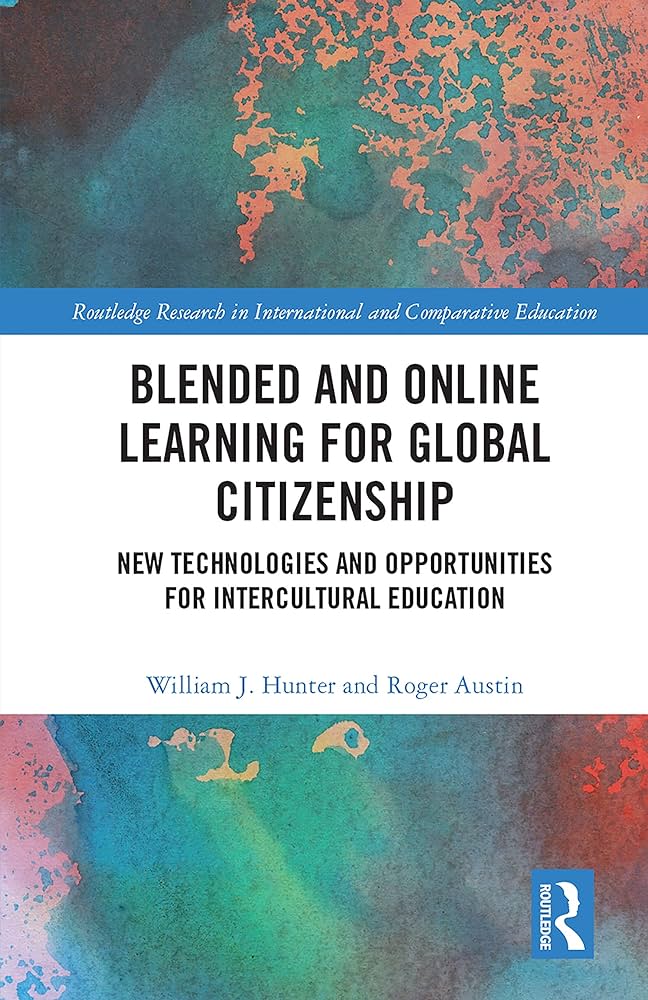
By showcasing international, European, and community-based projects, this volume explores how online technologies and collaborative and blended learning can be used to bolster social cohesion and increase students’ understanding of what it means to be a global citizen.
With the pace of technology rapidly increasing, Blended and Online Learning for Global Citizenship draws timely attention to the global lessons being learned from the impact of these technologies on peace building, community development, and acceptance of difference. In-depth case studies showcasing successful projects in Europe, Northern Ireland, and Israel explore blended learning and illustrate how schools and educators have embraced online technologies to foster national and international links both within and beyond communities. This has, in turn, equipped students with experiences that have informed their attitudes to cultural and political conflicts, as well as racial, ethnic, and social diversity.
Building on the authors’ previous work Online Learning and Community Cohesion (2013), this thought-provoking text will be of interest to researchers, academics, and postgraduate students in the fields of international and comparative education. Educators and school leaders concerned with how multiculturalism and technology play out in the classroom environment will also benefit from reading this text. - Editors: Bill Hunter, Roger Austin (2020)
-
The digital principal (Hughes & Burke, 2014)
The digital principal
- Janette Hughes, Anne Burke (2014)
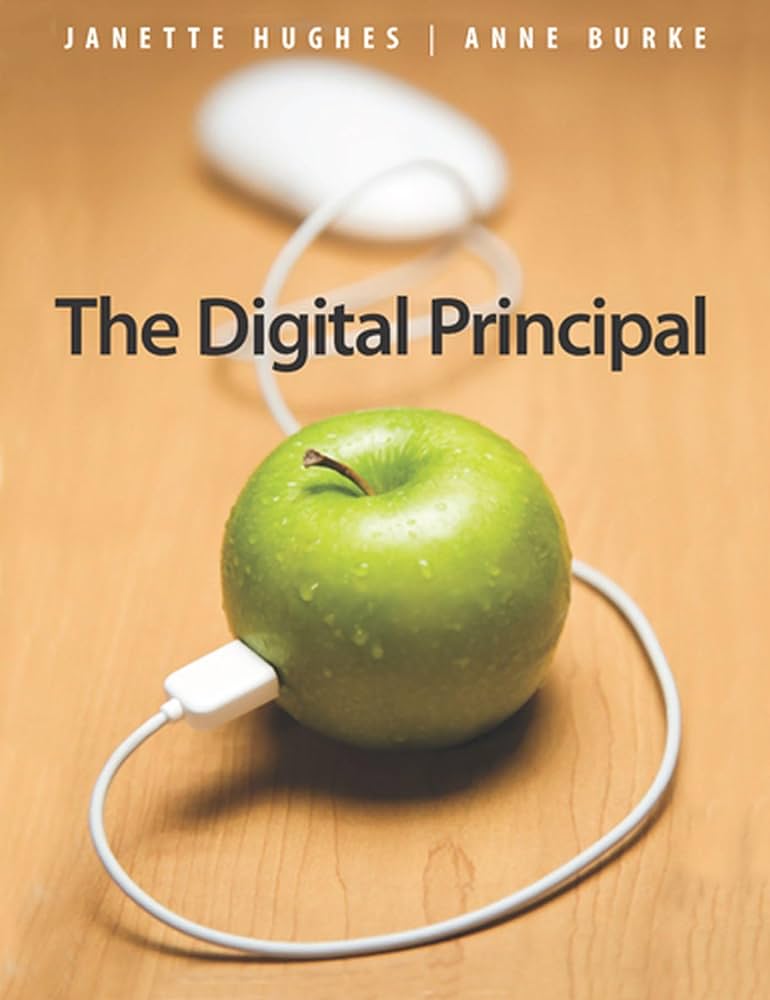
How to encourage a technology-rich environment that meets the needs of teachers and students.
Although education leaders do not have to be digital experts, they need to recognize the importance of supporting learning communities that embrace technological innovation, engaging students and building on their experiences. The Digital Principal shows education leaders how to apply their leadership skills to the challenge of creating and supporting a learning environment rich in technology and opportunities for both students and teachers to work, teach, and learn in the digital age. From the basics of digital literacy and good citizenship, to connecting to the digital community and accessing digital and virtual worlds, this book establishes a framework for integrating technology into instruction and learning. This timely book describes effective methods leaders and administrators can really use to provide visionary leadership in the digital age. - Janette Hughes, Anne Burke (2014)
-
Digital privacy: Leadership and policy (Robertson & Muirhead, 2022)
Digital privacy: Leadership and policy
- Editors: Lorayne Robertson, Bill Muirhead (2022)
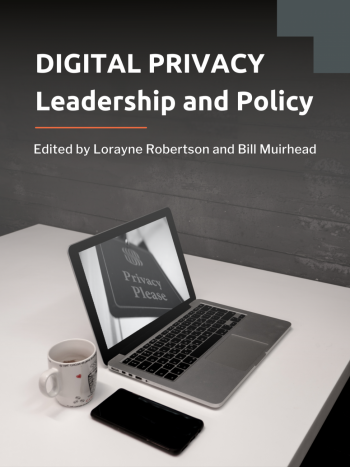
The e-book Digital Privacy: Leadership and Policy is a companion to the online course of the same name, and is situated in the context of education.
- Editors: Lorayne Robertson, Bill Muirhead (2022)
-
Exceptional leadership by design: How design in great organizations produces great leadership (Elkington et al., 2018)
Exceptional leadership by design: How design in great organizations produces great leadership
- Editors: Rob Elkington, Madeleine van der Steege, Judith L. Glick-Smith, Jennifer Moss Breen (2018)
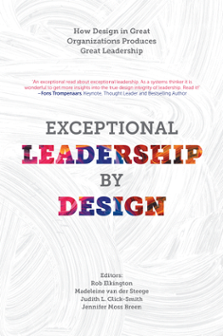
Imagine a world with great leadership. What would that world be like? Would it be a better world or a worse one? Now ratchet great leadership up to exceptional leadership and suddenly we have cause for optimism. But how do we design exceptional leadership, and would we even know it if we saw it? Traditional paradigms of leadership have celebrated decisive top-down control and analytical decision-making. But times are changing. The world is more connected, complex, fluid and interdependent.
This book debunks the myth that leaders need to be creative like designers to apply Design Thinking. Applying design approaches and practices to organizational leadership is not just about its leaders becoming more creative. It is definitely not about the person at the top coming up with the grand answer. Design thinking starts with the 'pain point' related to the problem you are trying to solve. You get to the heart of the issue. It is a collaborative effort that neatly leads stakeholders and representatives affected by the problem to design novel leadership solutions that actually work. - Editors: Rob Elkington, Madeleine van der Steege, Judith L. Glick-Smith, Jennifer Moss Breen (2018)
-
IAmLearning: Mobilizing and supporting educator practice (Power et al., 2017)
IAmLearning: Mobilizing and supporting educator practice
- Editors: Rob Power, Mohamed Ally, Dean Cristol, Agnieszka Palalas (2017)
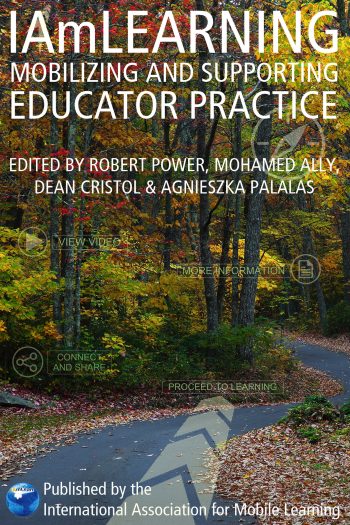
Teachers are more likely to experiment with and integrate mobile learning strategies if they feel confident in their ability to do so. Professional development resources and activities that focus on making instructional design decisions can help to increase teachers’ confidence with mobile learning. Teachers have indicated that a community of practice would also help them to increase their confidence with mLearning. To that end, mobile learning experts and practitioners from the International Association for Mobile Learning (IAmLearn) have prepared this open access eBook to help create such a community of practice.
- Editors: Rob Power, Mohamed Ally, Dean Cristol, Agnieszka Palalas (2017)
-
Making, makers, makerspaces: The shift to making in 20 schools (Hughes, 2022)
Making, makers, makerspaces: The shift to making in 20 schools
- Editor: Janette Hughes (2022)
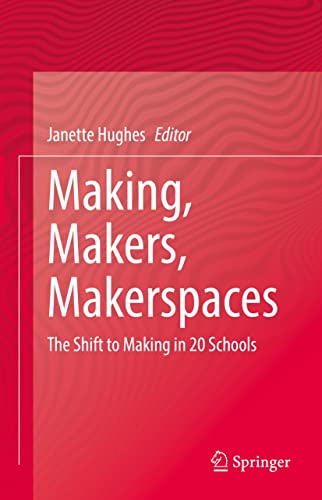
This book is about makers and makerspaces in education. It furnishes and analyzes case studies from sixty teachers working in twenty different school districts in Ontario, Canada. Each author provides research and analyzes data about the process of establishing makerspaces and implementing maker pedagogies with students in grades K-8.
The first chapter sets the stage for the book, describing the theoretical framework and methodology used and offering information on the schools in which the research occurred. Subsequent chapters focus on specific topics and individual case studies, including assessment, pedagogic techniques, equity, inclusivity, and methods of making. The book will prove valuable to both researchers and practitioners, any educator interested in this developing topic, including school leaders, school district leaders, educational researchers, and teacher educators. It will also be useful for initial teacher education programs.
- Editor: Janette Hughes (2022)
-
Self-regulation and inquiry-based learning in the primary classroom (Jacobs, 2022)
Self-regulation and inquiry-based learning in the primary classroom
- Brenda Jacobs (2022)
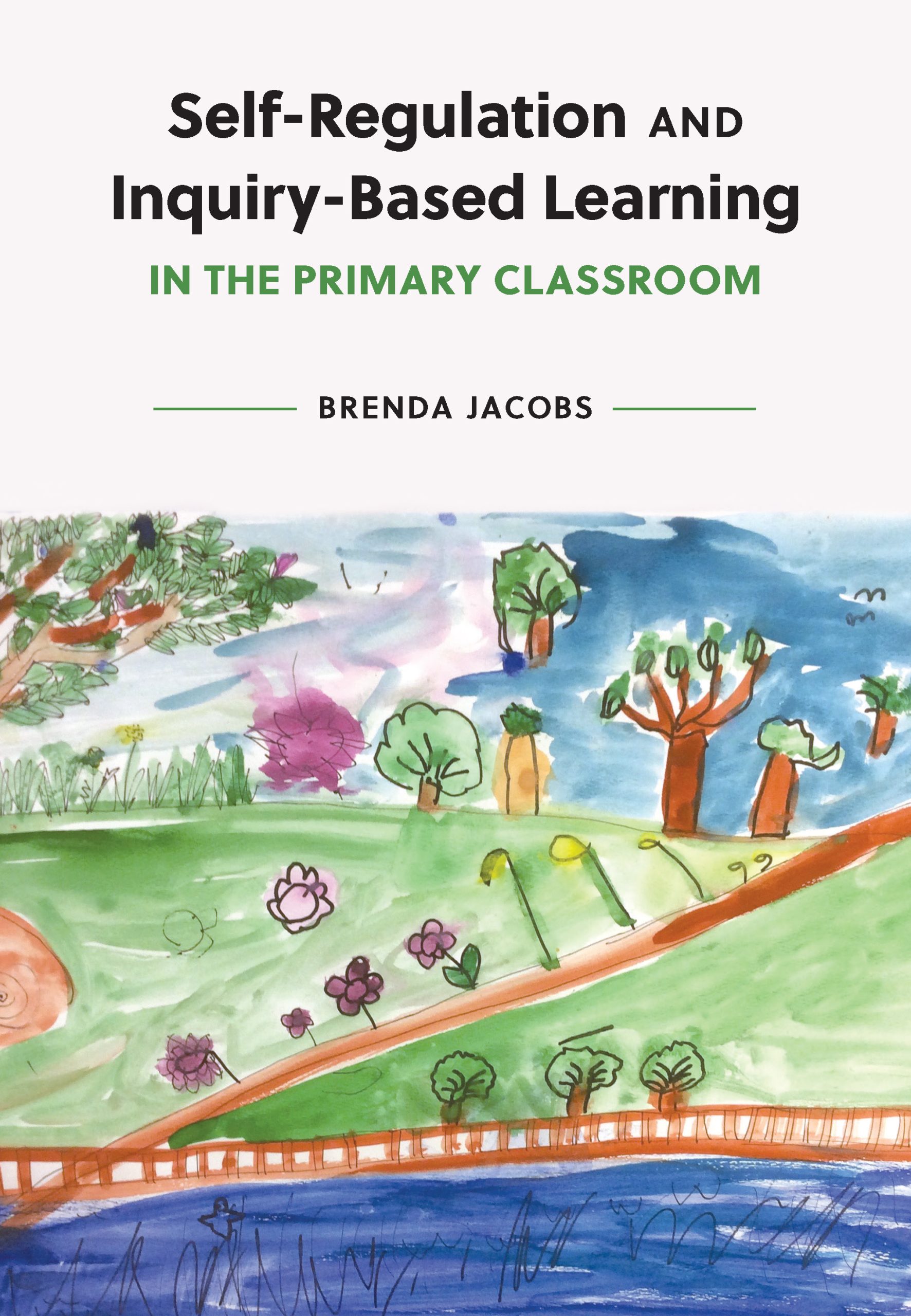
In this unique text, Dr. Brenda Jacobs brings together two important ideas that have become central to learning and development in education, demonstrating the core relationship between self-regulation and inquiry-based learning in primary classrooms.
The author compellingly shows that inquiry-based learning can empower children and is vital to becoming self-regulated learners. Drawing on real-life classroom examples, the volume outlines four key insights: that children learn self-regulation during inquiry-based learning in the same way they do during play; that teachers can use scaffolding strategies to support this development; that inquiry-based learning promotes the positive emotions essential for the development of social and emotional learning; and, finally, that during inquiry-based learning, children use oral language as a self-regulatory tool. These insights are applied to the four components of emergent curriculum—inquiry design, classroom environment, conversation, and documentation—to show how educators can help children become self-regulated learners. Considering how COVID-19 has exacerbated children’s social, emotional, behavioural, physical, and mental health problems, this timely volume also provides guidance about how to do inquiry-based learning in virtual classrooms. - Brenda Jacobs (2022)
-
Technology in the curriculum (Stokes & OER Lab, 2021)
Technology in the curriculum
- Editors: Ayman Abdulkadir, Pranjal Saloni, Rebecca Maynard (2021)
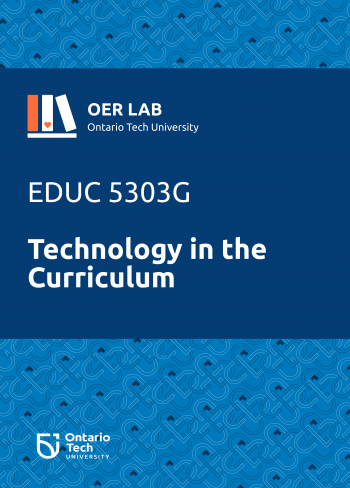
- Project Manager: Sarah Stokes
This open educational resource was compiled by students in EDUC 5303G – Technology in the Curriculum, a Masters course at Ontario Tech University. This work, which represents the culmination of a course assignment, is a collection of critiques and evaluations of digital technology tools that can impact the classroom and the administrative duties of teaching professionals. Each submission is the work and opinion of the original student author and is meant to provide a resource for practitioners or students of education in order to integrate technology into their teaching practice.
Open educational resources are an excellent way of providing highly accessible material that can be both edited and expanded upon by other contributing authors. The work of these student authors provides insight into the technology tool but also insight into the ways in which they perceive the tools themselves, the evaluation of the tool, and the students’ opinions in the context of professional teaching praxis. - Editors: Ayman Abdulkadir, Pranjal Saloni, Rebecca Maynard (2021)
-
Thriving online: A guide for busy educators (Kay & Hunter, 2022)
Thriving online: A guide for busy educators
- Editors: Robin Kay, Bill Hunter (2022)
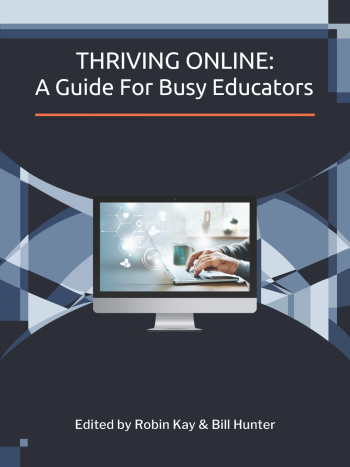
This book focuses on helping educators (secondary school and higher education level) succeed and thrive in blended and online learning settings. Grounded in evidence-based practices and principles, we share diverse and extensive insights on starting out, differentiated learning, learning activities, feedback and assessment, and useful tools. Each chapter includes a subject overview, guidelines, activities or tools, and general resources.
- Editors: Robin Kay, Bill Hunter (2022)
Book Chapters
-
Approaches to teacher education (Kitchen & Petrarca, 2016)
Approaches to teacher education
- Julian Kitchen, Diana Petrarca (2016)
Initial teacher education programmes vary in guiding principles, structure, format, funding, and pedagogies. At the same time, most are similar in touching on a wide-range of topics and themes without clear guiding principles. This has contributed to the contention amongst various stakeholders that we do not “do” teacher education well. The limitations of these conventional approaches used in universities around the globe have prompted significant innovations internationally, including alternative approaches to teacher preparation outside the university. To understand and learn from a range of teacher education programmes and practices, this chapter examines initial teacher education examples that typify the three crucial elements of theory, practice, and reflection. This chapter also explores initial teacher education programmes that attempt to systematically and thoughtfully integrate all three elements. In the context of this chapter, practice refers largely to the practical application of knowledge and skills within the school settings. Theory is used broadly to refer to the theory and research specific to the content of teacher education courses. Reflection refers to the complex, active, and intentional meaning-making activities. Approaches to teacher education that exemplify high engagement with a single element are examined, followed by approaches that attempt to integrate all three.
-
Considerations of equity for learners experiencing mathematics difficulties: At the nexus between mathematics and special education (Ruttenberg-Rozen & Jacobs, 2022)
Considerations of equity for learners experiencing mathematics difficulties: At the nexus between mathematics and special education
- Robyn Ruttenberg-Rozen, Brenda Jacobs (2022)
In this chapter, we explore equity for learners experiencing difficulties in mathematics (MD) at the nexus of special education and mathematics education, with a focus on Gutierrez’s four dimensions of equity. First, we explore narratives and positioning of learners experiencing difficulties: What and how are deficit narratives constructed around learners experiencing MDs? In the next section, we explore the consequences of those deficit narratives: How has the literature and school intervention typically responded with interventions for learners experiencing difficulties? And how are those interventions connected to deficit narratives about learners experiencing MDs? In the last sections, we offer a way forward: How can we provide mathematical opportunities to support learners experiencing MDs?
eCampus Ontario Projects
-
Creating equitable, diverse, and inclusive assessments in online and blended learning (Lauricella et al., 2022)
Creating equitable, diverse, and inclusive assessments in online and blended learning
- Sharon Lauricella, Allyson Eamer, Alison Mann, Tricia Dwyer-Kuntz, Robin Kay, Christopher Craig (2022)
This course provides useful approaches, frameworks, and practical strategies to introduce equitable, diverse, and inclusive (EDI) assessment strategies in the online or hybrid environment.
- Module 1 begins the course with an examination of the purpose of assessment so that users can consider what assignments they require, how such assignments connect to overall course goals, and how instructors can ensure that all such assessments meet student needs in the digital environment.
- Module 2 considers the important element of feedback and the various ways that feedback (and feedforward) can help meet EDI requirements for formative learning experiences in the digital environment.
- Module 3 gives particular attention to peer and self-assessment, and how instructors and students can engage in meaningful assessment with EDI top of mind.
- Module 4 contains a concise list of web-based tools in a variety of categories that can get users started with meaningful, inclusive, and equitable assessment that meets the needs of diverse student groups.
-
Development of an XR-art studio application to enhance remote learning of the traditional arts (Hogue et al., 2022)
Development of an XR-art studio application to enhance remote learning of the traditional arts
- Andrew Hogue, Veronika Szkudlarek, Alvaro Quevedo, Roland van Oostveen (2022)
The shift from in-person studio instruction to virtual classrooms, accelerated by the COVID-19 pandemic, revealed many learning disparities in the visual Arts associated with developing proper prediction of colour to nurturing colour sensitivities of cross-cultural perspectives. Our XR learning tool assists students both in the context of their own work and a broader artistic discourse, enabling a new generation of creators to develop transferable knowledge as well as psychomotor skills. Combining the Game and XR development expertise at Ontario Tech University with the Traditional Fine Arts expertise at OCADU, the XRAS is an innovative and effective solution to the challenges presented by remote learning.
The XRAS app goal is to simulate the fundamental aspects of a traditional art studio using XR to bring the studio into students’ own homes. XR, an umbrella of rapidly-advancing, immersive technologies including virtual (VR), augmented (AR) and mixed (MR) reality. XR is an exciting tool for developing engaging virtual experiences for creators, facilitating the visualization and practice of skills otherwise dependent on specialized equipment and in-person educational settings. XR provides opportunities to democratize and disseminate learning tools cost-effectively and enables long-distance collaboration from urban to remote communities, both at home and abroad. -
FOCUS - Fostering our Compassion, Understanding, and Self-care (Stanyon et al., 2022)
FOCUS - Fostering our Compassion, Understanding, and Self-care
- Wendy Stanyon, Diana Petrarca, Bridgette Atkins (2022)
This online learning resource is a gateway to Fostering Our Compassion, Understanding, and Self-Care (FOCUS). The Internet is filled with so many resources on mindfulness practices that it can sometimes be overwhelming and confusing to navigate. FOCUS is simply an introduction to the mindfulness world by providing students, staff, and faculty (and all individuals) with opportunities to learn about and practice mindfulness. Documented benefits of developing a mindfulness practice include but are not limited to: stress reduction, enhanced self-care, and increased well-being (Paulson, Davidson, and Kabat-Zinn, 2013). FOCUS is filled with ideas, resources, practices, and research regarding why and how mindfulness practice can help us in our daily living, including developing more compassion for ourselves and others.
This stand-alone, self-paced, learning opportunity can be embedded into the core curricula of postsecondary institutions to help generate a campus-wide culture of wellbeing, and enhance students’ ability to be resilient across both their academic and professional life. FOCUS can be incorporated with and relevant to a wide range of learning contexts (i.e. potentially applicable to any discipline, and usable in fully online and blended learning contexts), providing learners and educators across disciplines with tools in mindfulness and self-care. FOCUS is intended to be self-paced and learners might want to complete a little bit each day, taking time to reflect and practice, while some might wish to complete the module in one sitting—it is up to the individual.
Going through FOCUS is simple! Just follow the prompts, click on buttons, view videos, breathe, contemplate, try some of the activities, and progress through the activities at your own pace. Fostering compassion, understanding and self-care is a personal journey, and FOCUS is a tool to help along the way.
-
Inclusive and experiential pedagogies for undergraduate mathematics and computer science (Ruttenberg-Rozen et al., 2023)
Inclusive and experiential pedagogies for undergraduate mathematics and computer science
- Robyn Ruttenberg-Rozen, Andrew DiVito, Ami Mamolo, Miroslav Lovric, Jeremy Bradbury, Katelin Hynes (2023)
This interactive and multi-modal e-course is designed to help instructors of university mathematics and computer science enhance and apply skills for leveraging innovative and inclusive approaches to support experiential learning and student achievement. Specifically, the course examines the connections between engaging in computational modelling and experiential learning practices and lays a foundation for how to enhance pedagogy through activities that engage students in mathematically analyzing and modelling socially relevant issues that are important to them. Course takers learn about inclusive teaching practices that strive to cultivate equitable and accessible learning environments where students feel valued and supported, and experience a sense of belonging. In mathematics and computer sciences, inclusive teaching goes hand-in-hand with opportunities for students to experience real mathematics and computer programming in pursuit of solutions to real problems that are meaningful to them.
By the end of the course, mathematics and computer science instructors will have new insights and resources through which to frame and extend their current teaching practice with experiential learning opportunities and inclusive pedagogies.
-
Navigating difficult conversations (Eamer et al., 2022)
Navigating difficult conversations
- Allyson Eamer, Janette Hughes, Robin Kay, Nancy Fraser, Louise Hastie, Immaculate Namukasa (2022)
Navigating Difficult Discussions is a 4-module online program, culminating in a certificate that prepares post-secondary educators to facilitate difficult conversations in their classes and in other areas within their professional contexts. This self-paced program will engage the learner with the principles of civil discourse, navigating polarity, and separating the (objectionable) opinion from the person (who advances that opinion). The program will also familiarize educators with Equity, Diversity and Inclusion (EDI) themes such as race, social class, gender, sexual orientation, privilege, and decolonization; but it goes beyond that to provide the skills that encourage students, faculty members and colleagues to engage with these themes through the lens of transformative justice rather than shutting down/calling out those whose positions result in conflict and offense. Post-secondary institutions are struggling to balance their support of free speech (and academic freedom) with their support of social justice movements, and thus this program will help educators to consider their role in promoting civil discourse on campus.
Upon completion of this 4-module training program, instructors will be able to:
- Use an understanding of EDI (Equity, Diversity, Inclusion) to recognize the language and attitudes which trigger a shutdown response;
- Reflect on their own identity components and personal values;
- Demonstrate greater self-awareness of what makes them uncomfortable and why;
- Interrupt triggering communication styles in real time in a manner that encourages continued engagement;
- Show an understanding of how privilege informs assumptions, presuppositions, biases and what we conceive of as “common sense;”
- Model the tools to foster the ability to see multiple perspectives;
- Apply the tools to foster compassion and respect.
-
Student mental health and virtual teaching strategies: Learning modules for educators (Laffier, 2022)
Student mental health and virtual teaching strategies: Learning modules for educators
- Jennifer Laffier (2022)
This is a three-module course for educators titled “Student mental health and virtual teaching strategies”. This online training is intended for post-secondary educators who are teaching in a virtual environment. Many students are struggling with mental health difficulties (MHCC, 2020) and experience barriers to learning. It is imperative that educators understand the mental health struggles students may experience so they can develop and apply effective teaching strategies and accommodations to support students’ learning journeys. In this three-module course, educators will learn about various mental health problems and how they impact learning and performance, especially within virtual learning spaces. Evidence-based teaching strategies and accommodations are presented as they relate to virtual learning and teaching. This training will include self-assessment tools for educators so they can determine their level of mental health literacy, digital wellness literacy and openness to mental health accommodations and supports.
-
Teaching with technology in undergraduate mathematics (Mamolo et al., 2022)
Teaching with technology in undergraduate mathematics
- Ami Mamolo, Kitty Yan, Miroslav Lovric, Parker Glynn-Adey, Robyn Ruttenberg-Rozen, Sean Bohun, Sheree Rodney (2022)
Teaching with Technology in Undergraduate Mathematics is a self-paced and flexible e-course designed for graduate students and university instructors who are looking to enhance their teaching practice with new techniques. The skills and competencies acquired through this e-course equip educators with tangible takeaways and practical strategies for teaching in face-to-face, blended, and online settings. At the forefront of this e-course is the importance of mathematical activity and interactions for advancing student learning and for creating inclusive and innovative lessons. This e-course includes a set of four interactive online modules, a supplementary workbook and resource guide, and multiple pathways for differentiated learning experiences.
This e-course provides a flexible, holistic, and in-depth experience through a combination of inquiry-based explorations, online applets, dynamic and computational modeling, video podcasts, and interactive simulations. With differentiated pathways for graduate students and instructors, learning is tailored to participants' own teaching context. Course activities introduce a broad range of accessible and available digital technologies that can be leveraged to enhance teaching, and invite participants to apply their learning in practice, reflect on the experience, and envision new possibilities. After completing the first module, participants will earn a certificate in Digital Fluency for Mathematics Teaching. Differentiated pathways allow participants to choose to continue further and earn one of two possible certificates in Teaching with Technology in Undergraduate Mathematics or Leveraging Technology for Mathematics Tutorials.
-
TEd-ViV (Teacher Education Video Vignettes; Petrarca & Kitchen, 2022)
TEd-ViV (Teacher Education Video Vignettes)
- Diana Petrarca, Julian Kitchen (2022)
TEd-ViV (Teacher Education Video Vignettes) refers to a series of animated video vignettes for Ontario’s initial teacher education (ITE) programs to access and use within a variety of ITE program courses. This will provide ITE program students (teacher candidates or TCs--i.e. future teachers) opportunities to analyze the oftentimes messy moments in K-12 classrooms that not all TCs have the opportunity to view within practicum. It is well documented that in order for K-12 teachers to foster deep learning in their own students, initial teacher education (ITE) programs must also teach for deeper learning, equity, and social justice (Darling-Hammond & Oakes, 2019). Practices that foster deeper learning within ITE programs include integration of coursework and field experiences, modeling of deeper learning pedagogies in coursework and in the field, and applying knowledge in practice (Darling-Hammond & Oakes, 2019). These video vignettes seek to address the noted gap of video examples within an Ontario context and to foster deeper learning of our future teachers so that they could foster deeper learning in their K-12 students.
This collection of vignettes is designed to generate authentic learning experiences for teacher candidates. The vignettes offer opportunities for teacher candidates to apply their professional knowledge, ethical judgment and pedagogical skills to authentic situations that commonly occur in schools. Each vignette focuses primarily on a single theme derived from the accreditation requirements from the Ontario College of Teachers, while often intersecting with other important themes. The vignettes are intended to generate deep reflective and critical learning through the guidance of a teacher educator in a foundational course, pedagogical course, or course that connects theory to practice in the field. Teacher educators might employ a vignette to open exploration of a topic. Alternatively, a vignette could be used for the application of concepts introduced by the teacher educator or through course readings. Finally, a vignette could be used as part of a culminating activity to demonstrate deep thinking about possible situations that occur in practice.